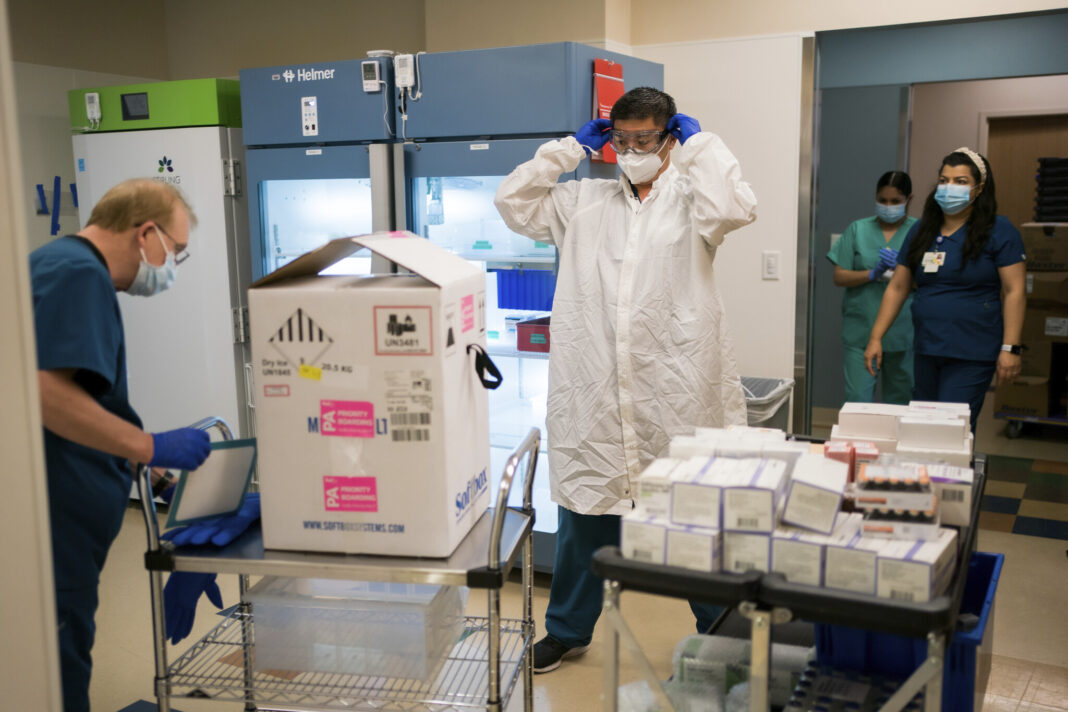SAN FRANCISCO—The UCSF Medical Center received its first shipment of 975 doses of the Pfizer-BioNTech COVID-19 vaccine on Wednesday, December 16. The vaccine was administered to frontline employees, including nurses, respiratory therapists, custodial workers, phlebotomists, and physicians, UCSF spokesperson Elizabeth Fernandez said.
The vaccine, developed in collaboration between the New York-based Pfizer and the German-based BioNTech pharmaceutical companies, was approved by the Food and Drug Administration on December 11.
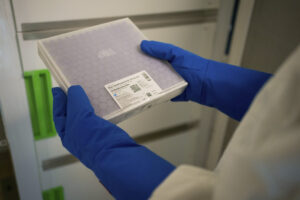
UCSF expects 11,900 doses of the vaccine by the end of December, and is one of the first hospitals in California to receive the recently FDA-approved Pfizer-BioNTech vaccine to immunize its frontline workers.
“Our vaccine shipment today arrived via FedEx,” Fernandez said. The process of transporting 3 million doses of Pfizer-BioNTech vaccine began on Sunday morning. The shipment of Pfizer-BioNTech vaccine was transported by trucks and planes to over 600 sites, including hospitals and pharmacies in all 50 states, was considered a major logistics challenge, given the fact that the vaccines have to be kept in special boxes at negative 94 degrees Fahrenheit without being opened any more than two times a day.
The initial phases of vaccinations are reserved for UCSF and UCSF Benioff Children’s Hospital Oakland employees who may be exposed to COVID-19 patients in emergency departments, acute care clinics, and some outpatient and inpatient units and clinics.
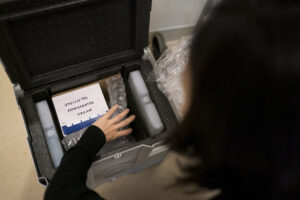
Other groups of staff and students are also included in the initial phases of vaccinations. Students and clinical fellows who have patient interactions are included. Researchers studying COVID are among UCSF community members to get vaccinations during these initial phases.
“For some UCSF frontline workers treating or serving patients with COVID-19 since February, the mid-December delivery of vaccines was met with hope, relief and tears of happiness,” said Laura Kurtzman, the UCSF Senior Public Information Representative in a press release.
One of the first vaccine recipients, Jennifer Reid, a surgeon and a trauma and critical care fellow at UCSF and Zuckerberg San Francisco General Hospital, who experienced the death of her father this year (not from COVID) is currently providing care for her mother who is undergoing chemotherapy treatment for cancer.
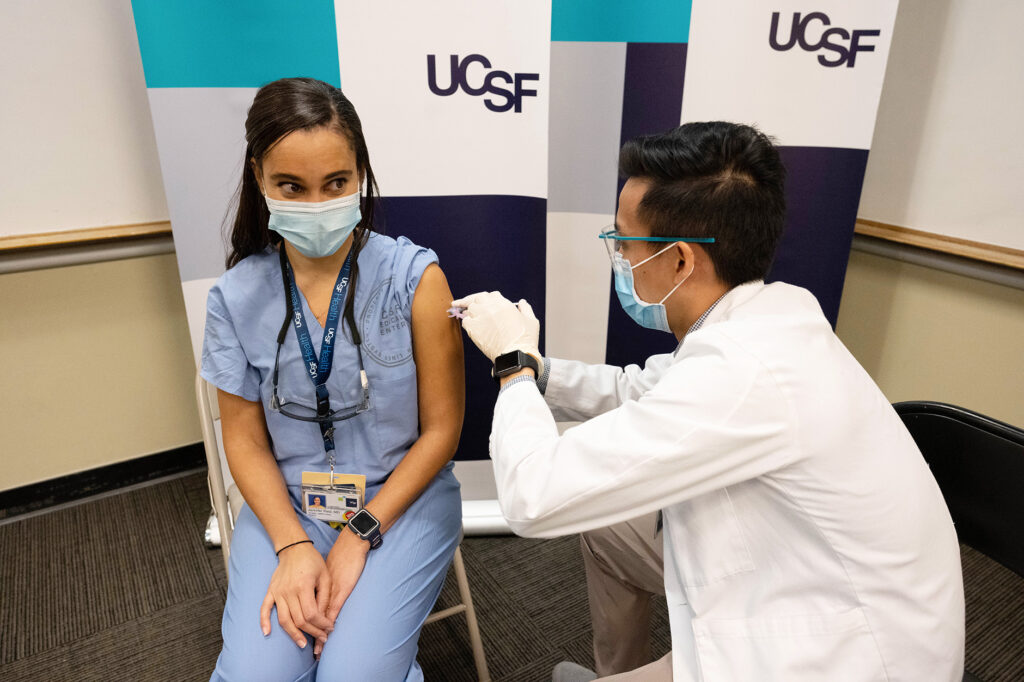
She told Kurtzman in an interview that her hardships have made her resilient and that emotions are high, as getting vaccinated will prevent exposing her mother who is suffering from a chronic illness to the disease. “When I found out I was getting the vaccine, I got very emotional,” Reid said. “Because I’m always worried about bringing COVID home. It has been a terrible year as a provider, but it has only made me more resilient, and has made me a better caregiver for my patients.”
As more doses are made available, vulnerable and high-risk UCSF patients, such as seniors (aged 65 and older) and those with chronic medical conditions such as asthma and heart disease, will be eligible for vaccination. During later phases of the vaccination program, other groups of healthcare workers, first responders, researchers, and staff such as police officers will be included.
UCSF is following a four-phase Framework for Equitable Allocation of COVID-19 Vaccine, established by the National Academies of Sciences, Engineering, and Medicine. Reid said it is a goal to get all UCSF community members vaccinated. Phase 1a covers 5 percent of the population and frontline hospital workers (in hospitals, nursing homes, or providing home care). Phase 1b covers adults over the age of 65 and high-risk patients.
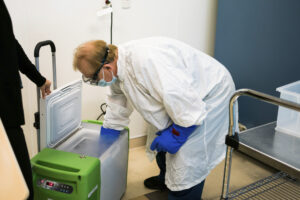
Photo by Maurice Ramirez/UCSF News.
As of December 17, one vaccine was approved by the FDA, with another, manufactured by Moderna, which has been recommended but not yet approved. Five vaccines to date are under limited use. Eighteen are under phase three trials, large-scale efficacy tests. There are 19 under phase 2 trials and 44 still in phase 1. Vaccines usually take years to develop, but it took the recently FDA-approved vaccine only nine months.
The federal government has a goal of getting 20 million people vaccinated by the year’s end. Daily COVID deaths reached a record Wednesday at 3,611 deaths. Pfizer and BioNTech expect to manufacture 1.3 billion doses worldwide by the end of 2021.
On Thursday, San Francisco’s Public Health Director Grant Colfax announced a new travel order requiring a mandatory 10-day quarantine for anyone travelling outside the Bay Area, which will go into effect as 12:01 a.m. on Friday. Offenders will be punished for a misdemeanor.
During a press conference, Colfax’s presentation included a graph, showing the number of new cases rising from 5 per 100,000 persons on October 1 to October 30 on December 10. “Yesterday, we reached a milestone that we were all hoping to avoid,” Colfax said. “Unfortunately, the Bay Area’s Intensive Care Unit (ICU) has fallen below 15%. We are averaging an extremely high case rate—242 cases a day. That is the highest we had since the onset of the pandemic.”
The presentation showed the state running out of available ICU beds. The state of California has an ICU remaining capacity of 3 percent. San Francisco Bay Area itself has only 13 percent of available ICU beds to treat the “sickest people.” Colfax said Santa Clara and San Mateo neighboring counties have no available beds for ICU patients.
Colfax said in San Francisco the number of COVID-positive patients has increased by 27 percent in just the past week. He stressed the ICU shortage dilemma amid rising COVID cases, and said the healthcare system in San Francisco was gravely threatened:
“We have a total of 286 Intensive Care Unit beds in San Francisco, but 207 are currently filled with patients with COVID and non-COVID illnesses. Given the continued rise in cases, we expect that our ICU beds will continue to fill rapidly with sick patients. The availability of beds as well as having enough staff, doctors, nurses, and other people on medical care teams, the backbone of the healthcare system, having enough beds and having healthcare teams is vital to our ability to keep people alive and get through COVID-19, and this status is gravely threatened,” said Colfax.
Colfax attributed the surge in cases to the holidays and urged community members to prevent a surge in the midst of the coming Christmas and New Years holidays.
“Imagine not having a hospital bed for your mom, or your dad, your grandmother, or your child, or any other loved one,” Colfax told the audience attending the online Zoom presentation, encouraging them to act responsibly to prevent the spread of the deadly disease in the San Francisco Bay Area.
“Imagine them getting suboptimal care, not getting the care, that we have the right to have in this city. Would you want that? None of us want our city and region to be in that situation, nor do we want our dedicated healthcare workers and first responders to take care of patients under the stress of a hospital surge,” he added.
UCSF Health uploaded a photograph of senior custodian William Wyatt, as one of the first frontline “healthcare heroes” to be vaccinated. In an expression of gratitude, Rex Marigold wrote in the comments section, “Mr. Wyatt, I am happy you got the vaccine first! You are doing an essential job helping people in these times. Thank you and keep on keeping on.”
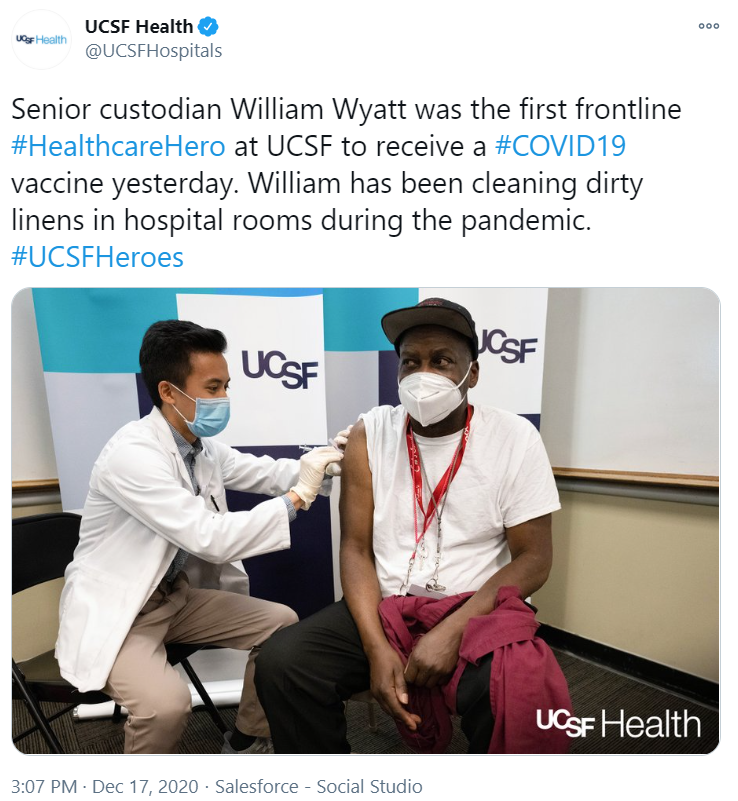
On Thursday, the Southern California ICU capacity dropped to zero percent. CNN reported on Friday that there were 52,000 confirmed new cases on the previous day, observing that if California were a country it would be a worldwide leader in COVID infections.

